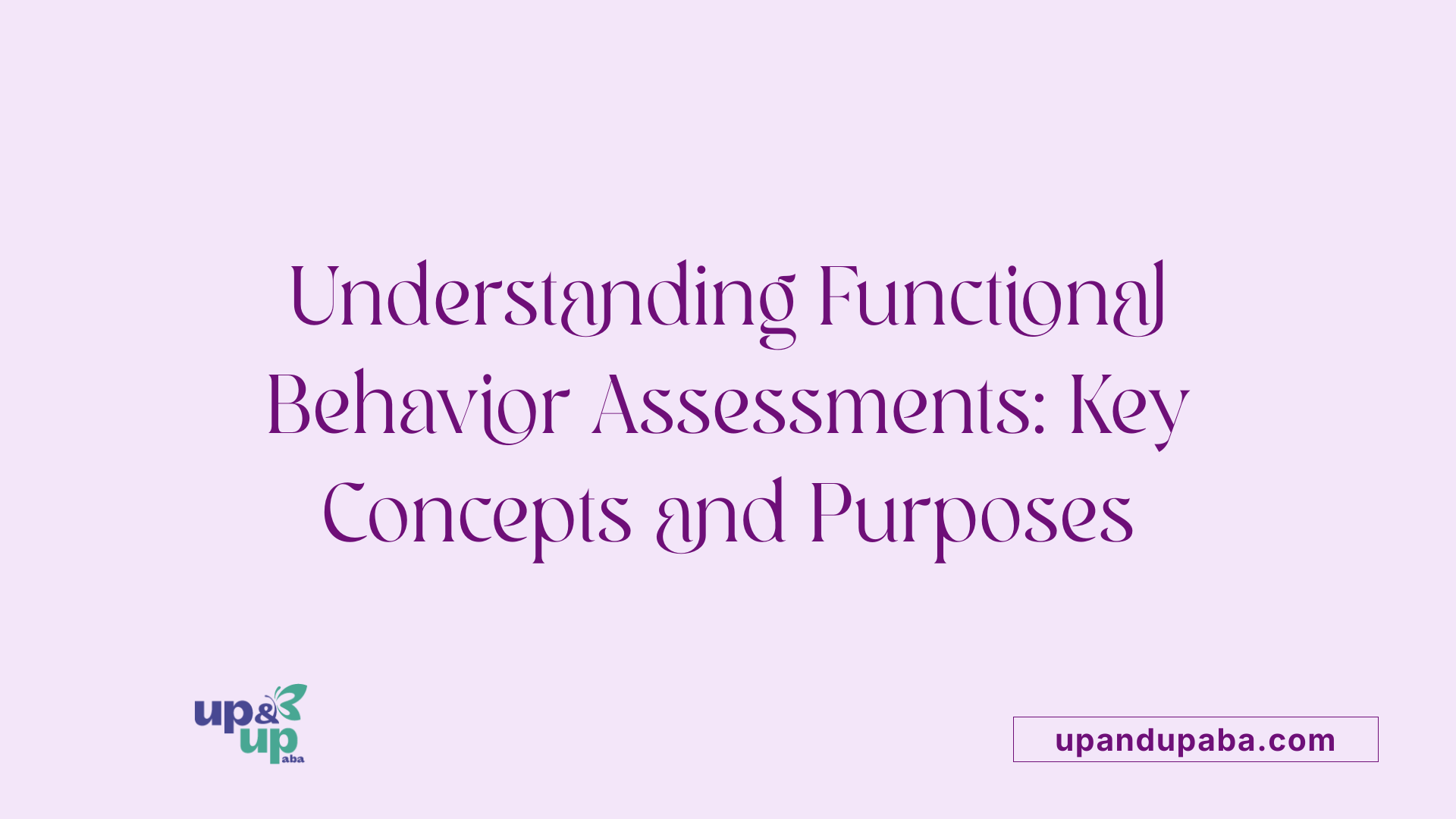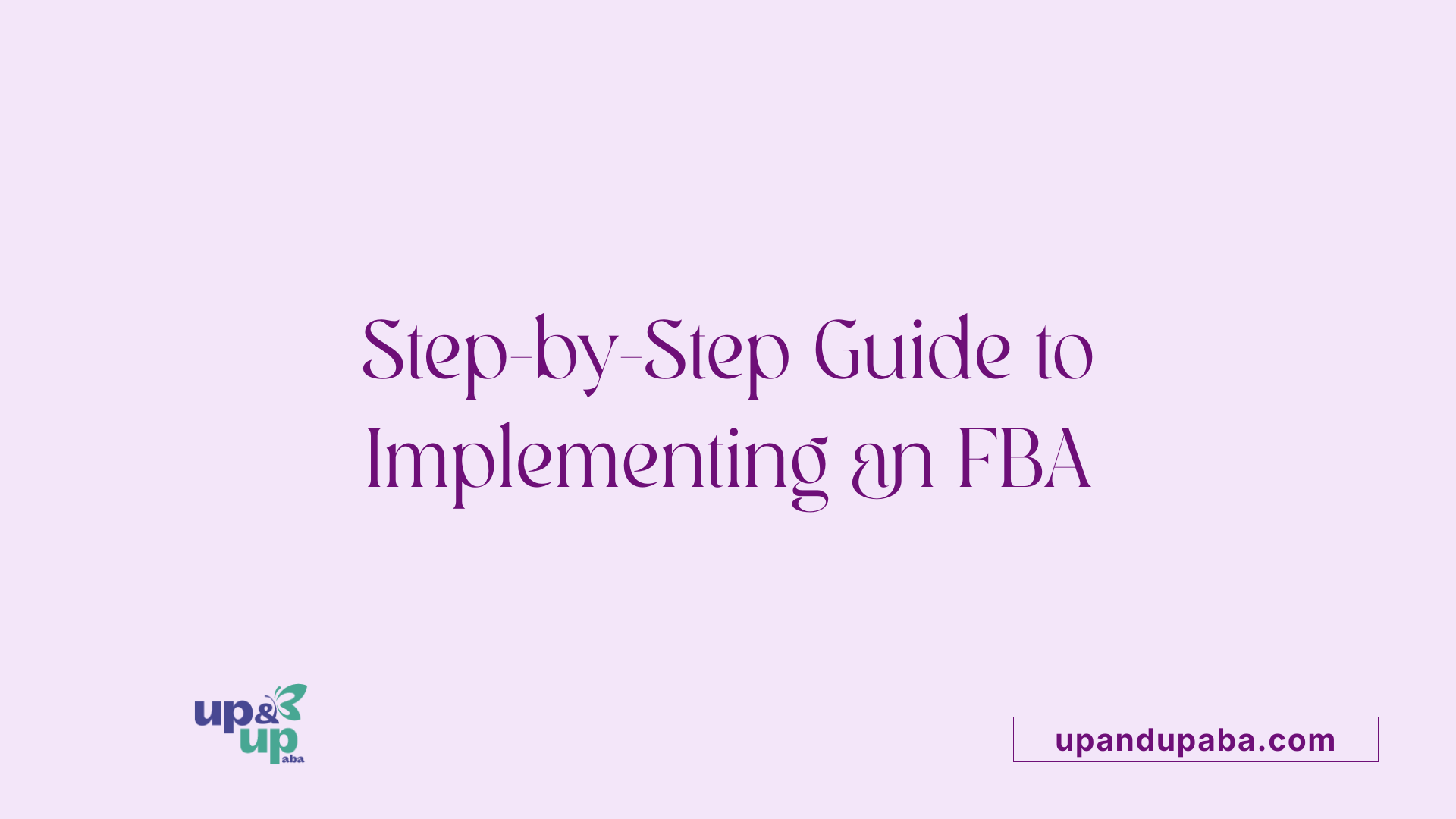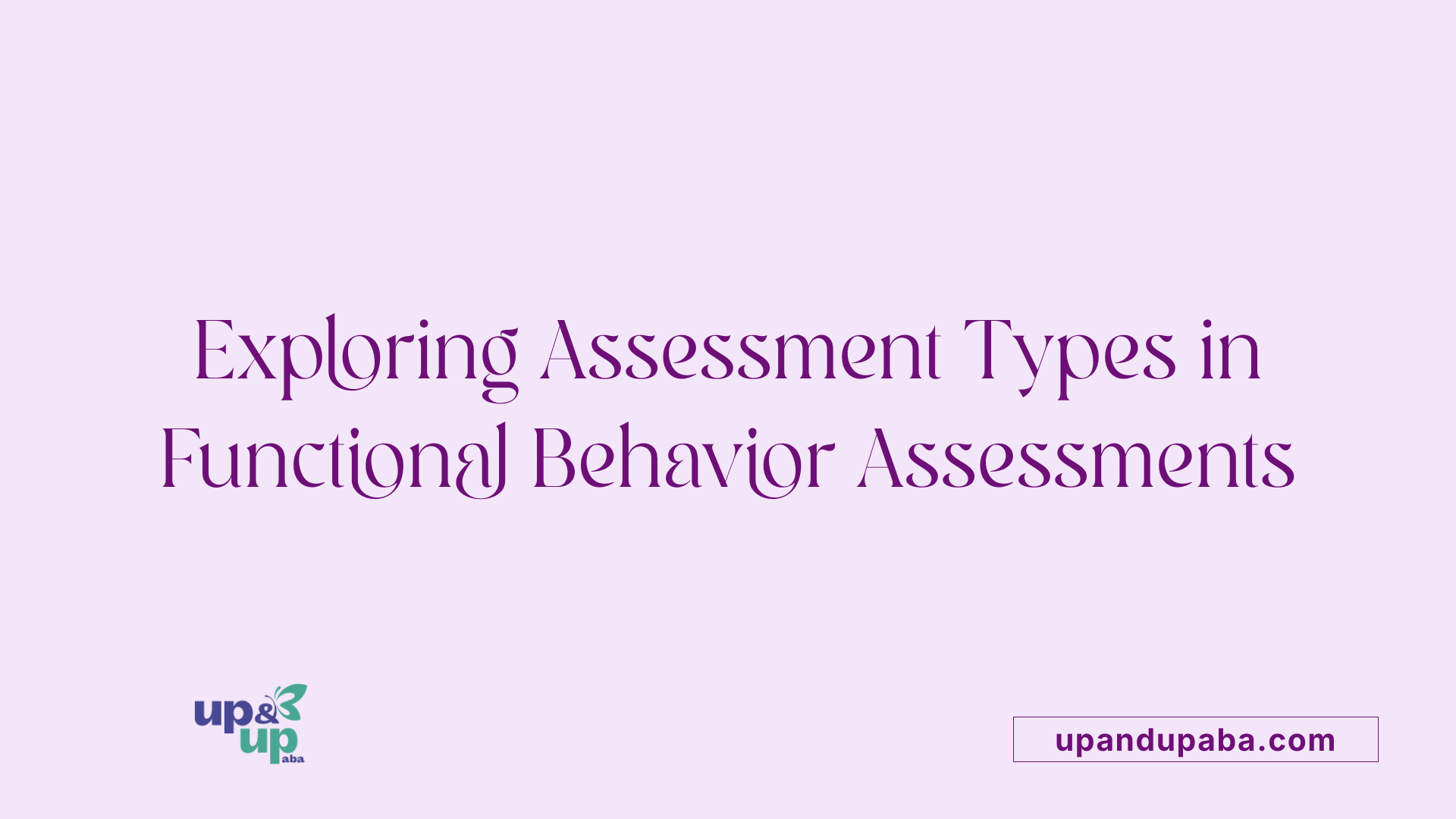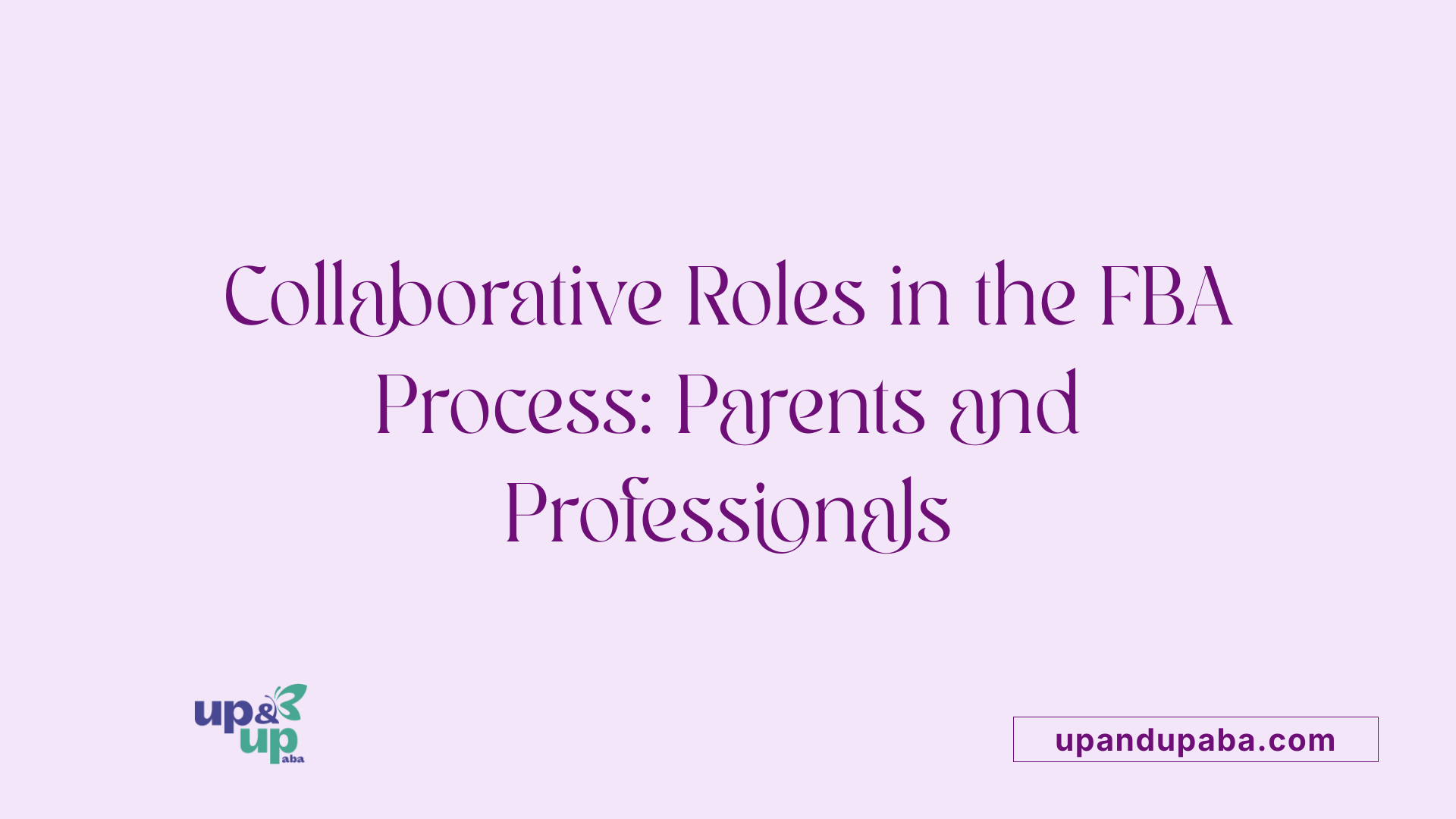Functional Behavior Assessment (FBA)
Demystifying the Functional Behavior Assessment Process

Understanding Functional Behavior Assessment
In educational settings, managing challenging behaviors effectively is crucial to providing a supportive learning environment for all students. Functional Behavior Assessments (FBAs) play an essential role in understanding why these behaviors occur, particularly in students needing individualized interventions. FBAs are a systematic approach used to identify the causes and functions of academic, social, or emotional challenges students may face, ultimately guiding the development of effective strategies to improve their behavior through targeted interventions. But what exactly does an FBA involve, and how do these assessments integrate with broader educational plans?
What Exactly is a Functional Behavior Assessment (FBA)?

Definition of FBA
A Functional Behavioral Assessment (FBA) is a systematic process undertaken to identify and analyze specific behaviors of concern in students. These behaviors can span across academic, social, or emotional domains. FBAs focus on collecting data regarding observable and measurable challenging behaviors, their antecedents—what occurs before the behavior—and consequences—what happens after the behavior.
Purpose of FBA in Educational Settings
FBAs serve several vital purposes in educational environments. First, they help educators understand why problematic behaviors occur, which is essential for effective intervention planning. Second, FBAs are crucial for developing Behavior Intervention Plans (BIPs) that outline strategic approaches to address and modify these behaviors. Research indicates that tailoring interventions based on FBA findings can significantly improve students' engagement and overall learning outcomes. Moreover, FBAs play a key role in multi-tiered systems of support (MTSS), specifically at Tier 3, targeting students who exhibit persistent behavioral challenges.
Regulatory Context Under IDEA
The Individuals with Disabilities Education Act (IDEA) mandates that schools conduct an FBA under specific circumstances. For instance, an FBA is required when a child with a disability is removed from their educational placement for more than ten days due to behavioral issues. Thus, adherence to IDEA guidelines ensures that students receive necessary support and that their educational rights are upheld. Additionally, the law encourages schools to conduct FBAs for at-risk students to prevent future disciplinary actions.
In general, FBAs are essential elements of a broader strategy focused on fostering positive behavior and supporting students' diverse needs in educational settings.
The FBA Implementation Process

What are the steps involved in conducting a functional behavior assessment (FBA)?
The process of conducting a Functional Behavior Assessment (FBA) entails several critical steps:
Identifying the Behavior of Concern: The first step is to clearly define the specific behavior that is problematic. This ensures that all stakeholders have a common understanding of what behaviors need to be addressed.
Gathering Information: Data is collected through a variety of methods including interviews with parents, teachers, and other caregivers, direct observations of the child in various settings, and document reviews. This information helps to formulate a comprehensive view of the child’s behavior.
Analyzing the Data: Once collected, the data is analyzed using the ABC model, which examines Antecedents, Behaviors, and Consequences to identify patterns and triggers related to the behavior.
Formulating a Hypothesis: Based on the analyzed data, a hypothesis is developed regarding the function or purpose of the behavior. This is crucial for understanding why the behavior occurs and how it can be addressed.
Developing a Positive Behavior Support Plan (PBS): This step involves creating a strategy that includes interventions aimed at reinforcing positive behaviors and reducing the problematic ones.
Implementing the Plan: The PBS is put into action, with all parties involved ensuring consistent application of the strategies outlined in the plan.
Monitoring and Evaluating Effectiveness: Ongoing evaluation is essential to assess whether the interventions are successful. Adjustments can be made based on the effectiveness of the support provided, ensuring it remains relevant to the child’s needs.
This systematic approach not only identifies the function of challenging behaviors but also assists in developing effective intervention strategies, promoting positive behavioral change and supporting the overall learning environment.
Types of Assessments within an FBA

What are the different types of assessments used within a functional behavior assessment (FBA)?
Functional Behavior Assessments (FBAs) utilize three main types of assessments:
Indirect Assessments – These involve the collection of data through interviews, surveys, or questionnaires. Caregivers and teachers provide valuable insights about the individual's behavior in various contexts, sharing their observations and experiences.
Direct Observational Assessments – This method entails real-time observation of the individual in their natural environment. Evaluators record behaviors, capturing patterns or triggers that may be influencing the behavior in question.
Functional Analysis (FA) – A more structured approach, FA manipulates different conditions to pinpoint specific antecedents and consequences that affect the behavior. This method can establish clear cause-and-effect relationships, leading to effective interventions.
Comparison of assessment types
| Assessment Type | Description | Use Case |
|---|---|---|
| Indirect Assessments | Data from interviews and questionnaires | Provides initial insights from multiple perspectives |
| Direct Observational Assessments | Real-time observation of behavior | Identifies patterns and circumstances directly |
| Functional Analysis (FA) | Manipulative condition-based testing | Clarifies antecedents and consequences for targeted interventions |
These complementary methods work together to tailor effective strategies for addressing challenging behaviors, especially in children with Autism Spectrum Disorder (ASD).
The Roles of Parents and Professionals in FBAs

Who is Involved in the FBA Process?
Functional Behavioral Assessments (FBAs) require the collaboration of various professionals and stakeholders to be effective. The primary individuals involved often include:
- School Psychologists: They are trained to conduct evaluations and analyses of behavior.
- Board Certified Behavior Analysts (BCBA): Specialists in behavior analysis who lead the FBA process.
- Special Education Teachers: They understand individual student needs and are crucial for gathering detailed classroom data.
- Members of the IEP Team: This includes teachers, administrators, and related service personnel, all of whom contribute valuable insights into the student's behavior.
- Parents and Guardians: Their involvement is vital as they provide contextual information that may not be observable in school settings.
How Do Parents Bridge Home and School Settings?
Parents play a critical role in connecting home and school environments during the FBA process. They are essential in:
- Informing the Assessment: Parents share behavioral patterns, triggers, and previous interventions that have or haven’t worked at home, guiding the team's understanding of the child’s needs.
- Collaborating on Solutions: By participating in discussions about strategies, parents ensure that consistency is maintained across both environments, enhancing the effectiveness of behavior interventions.
- Requesting Specific Assessors: While they may not have control over the final decision, parents can advocate for assessors with whom they feel comfortable and who understand their child’s needs.
Through this collaboration, the FBA process aims to create a holistic view of the child's behavior, supporting the development of a tailored Behavior Intervention Plan (BIP) that respects the insights of all parties involved.
FBAs as a Part of IEPs and BIPs
How do functional behavior assessments (FBAs) relate to Individualized Education Plans (IEPs) and Behavioral Intervention Plans (BIPs)?
Functional Behavior Assessments (FBAs) are critical in understanding the reasons behind a student’s challenging behaviors. When schools conduct an FBA, they gather vital information that informs the creation of a Behavior Intervention Plan (BIP). This plan outlines effective strategies and interventions tailored to address specific problematic behaviors.
The BIP must be integrated into the Individualized Education Plan (IEP), ensuring that interventions align with the educational and behavioral objectives set for the student. During the IEP meetings, the team considers any behaviors that may impede a student’s opportunity to learn. In this way, FBAs play an essential role in the IEP process, particularly for students demonstrating significant behavioral challenges.
In summary, the relationship between FBAs, BIPs, and IEPs is synergistic: the FBA informs the BIP, while the BIP guidelines are incorporated into the IEP. This triad is designed to provide a comprehensive and legally defensible approach to support students with disabilities. Here’s a concise overview of how these components interconnect:
| Component | Purpose | Connection |
|---|---|---|
| Functional Behavior Assessment (FBA) | Identifies problem behaviors and underlying causes | Provides data and insights for the BIP |
| Behavior Intervention Plan (BIP) | Outlines strategies to modify behaviors | Is integrated into the IEP to support educational goals |
| Individualized Education Plan (IEP) | Sets educational and behavioral objectives | Incorporates the BIP and guides overall student support |
This cohesive approach ensures that students receive the necessary support to meet their educational needs while effectively addressing behavioral challenges.
Conclusion: The Impact of FBAs in School Environments
Functional Behavior Assessments (FBAs) stand as a cornerstone of managing and improving student behavior in schools, offering a structured framework to understand and address challenging behaviors. By integrating FBAs into Individualized Education Plans and Behavior Intervention Plans, educators and professionals can create supportive, legally compliant educational experiences focused on the overall development of students, especially those with disabilities. Engaging with parents and informed professionals ensures a holistic approach to behavioral challenges, ensuring that interventions are personalized and effective. The impact of FBAs extends beyond mere compliance with educational policies; they pave the way for transformative change in learning environments, promoting positive student outcomes across various educational settings.
References
- [PDF] Functional Behavioral Assessment (FBA) and Behavior Intervention ...
- What is a functional behavioral assessment (FBA)? - Understood.org
- [PDF] Functional Behavioral Assessment (FBA) - PaTTAN
- Page 4: Conduct a Functional Behavioral Assessment - IRIS Center
- Functional behavior assessment (FBA)
- [PDF] Functional Behavior Assessment (FBA) - ---EBP Brief Packet - ERIC
- How to Do a Functional Behavior Assessment in ABA
- [PDF] Family Matters Functional Behavioral Assessments (FBAs) Fact Sheet
- Functional Behavior Assessment (FBA) - AFIRM |



